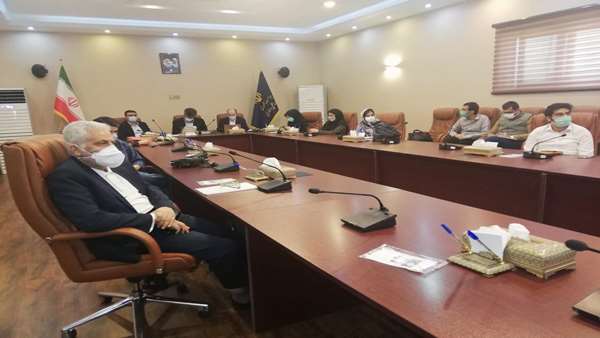Holding the 38th meeting of the working group of knowledge-based companies of the council: presenting technological projects focusing on clinical trials in new technologies of reconstructive medicine
According to the report of Public Relations and International Affairs of the Council for Development of Stem Cell Science and Technology, the 38th meeting of the working group of knowledge-based companies of the council was attended by Dr. Hamidieh, Secretary general of the council, Dr. Soltaninejad, director of technology and commercialization of the council. From 40 representatives of companies active in the field of stem cells and reconstructive medicine was held on May 9, 2021 at the Vice-Presidency for Science and Technology. In this meeting, in order to receive material and spiritual support from the council, technologists from different companies presented 9 technological projects.
At the beginning, Dr. Ebrahimi from Kian Imen Cell Company presented a project "Evaluation of the effect of active natural killer cells in patients with malignant brain tumors (phase 2 and 3 clinical trial)". Currently, countries around the world are developing cultures and genetic modification of immune cells (NK, DC, T cell) to target cancer. In Iran, few companies are responsible for culturing and ordering these cells and there is no standard center for provision of this type of cellular services.
Then Dr. Mansouri from Kermanshah University of Medical Sciences presented a project entitled "Study of the effect of exosomes derived from placenta mesenchymal stem cells on the improvement of clinical and laboratory symptoms in patients with lupus." Lupus is an autoimmune disease in which the immune system is mistakenly activated against the body's cells and causes damage to body tissues. Therefore, identifying the appropriate treatment strategy to control and help slow down the disease process can play an important role in helping the patient and reducing treatment costs.
After that, Dr. Erfani from Rakize Gene Fanavar Mavad Company presented the project "Design of Multiplex PCR kit for detection of EBV, CMV, BK and JC viruses and design of fungal galactomania antigen detection kit used in organ transplant centers". Patients receiving organ transplants are prone to a variety of opportunistic infections due to immunosuppressive drugs, which can lead to transplant rejection and mortality.
As the fourth project, Dr. Qazvini from Baqiyatallah University presented the project "Evaluation of safety and efficacy of surfactant (Broxorf) on lung macrophage cells for hyaline uptake through bronchoscopy on improving pulmonary function after Covid-19 in chronic pulmonary patients: "Multicenter Randomized Clinical Trial Study". Due to the widespread prevalence of Covid-19 and the prolongation of access time to vaccines and as a result the occurrence and prevalence of different mutant strains in the country, it is necessary to use different treatment methods that have the potential to be used to treat patients more effectively and faster for preventing the lack of facility or drug for a particular type of treatment.
In the next part of the meeting, Dr. Akbari Birgani presented the project "Production of a cancer model of zebrafish xenograft with the aim of formulating gene therapy using adenovirus (AAV) vector containing induced caspase-9 cell suicide gene". It is predicted that in the future, gene therapy will replace conventional drug therapy methods, and in 20 to 50 years, drug therapy will not be as common as it is today. The United States, Europe, and China are now leading the way, and it looks like they will soon have the largest gene therapy market with a growing trend.
After that, Dr. Modarresi from Tehran University of Medical Sciences presented the plan "Determining the safety and effectiveness of using mesenchymal stem cells in patients with cystic fibrosis". Cystic fibrosis is the most common autosomal recessive lung disease in the world for which no definitive cure has yet been found.
Then, Dr. Shojaei from Arvin Zist Bonyan Company presented the project "Extraction and preparation of stem cells suitable for the purpose of tooth reconstruction and restoration". In this project, according to the findings of cellular and molecular analysis related to stem cells extracted from different tissues, a suitable source for cell implantation to repair damaged or lost teeth is identified.
In the next part of the meeting, Dr. Esmailzadeh from Pishgaman Salamat Exir Company presented the project "Fissure sealant containing remineralizing nanoparticles and sibylized antibacterial hydroxyapatite". Due to the increase in decay of the posterior teeth of children, the use of decay prevention methods such as fissure sealants is necessary.
As the latest project, Dr. Jafarian from Tehran University of Medical Sciences presented the project "Production of pluripotent stem cells (iPSCs) based on the use of non-integrating RNA technology in the human genome." Pluripotent stem cells, as cells capable of self-regeneration and differentiation into specific cell types, have received much attention in restorative medical studies. These cells have been used successfully in the treatment of eye diseases. These cells do not have the problem of immunological rejection of the transplant and are widely used in screening, drug toxicity and disease modeling. Also, given that "patient-specific" iPS cells can be easily produced, there is a clear prospect for the therapeutic use of these cells in the future.
It should also be noted that after presenting each of the plans, some of the attendees, and especially the investors, the representatives of the accelerators present at the meeting, presented their views on the issues.




ارسال به دوستان